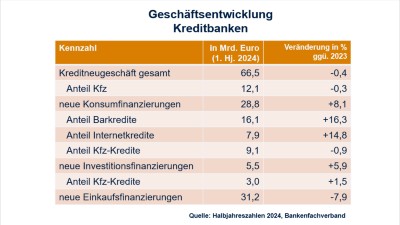The financial institutions that form the banking association reported a total of 200 billion euros in private and corporate loans at the end of June 2024. This is an increase of 3.5 percent compared to the first half of 2023.
Cash loans are particularly popular with private households.
Springer Fachmedien Wiesbaden GmbH
×
According to the banking association, the total volume of new loans in the first six months of the year amounts to 66.5 billion euros, almost at the level of the same period last year (minus 0.4 percent). “The credit banks are promoting the economy in an economic environment that continues to be characterized by high uncertainty,” explains Jens Loa, managing director of the banking association, the figures from the affiliated credit institutions for the first half of 2024.
Consumer financing with a significant increase
Consumer loans rose significantly again in the first six months, increasing by 8.1 percent to 28.8 billion euros. However, private vehicle financing declined slightly, falling by 0.9 percent to 9.1 billion euros. The largest increase was achieved by freely usable cash loans at 16.3 percent to 16.1 billion euros. According to the banking association, customers often complete these transactions online.
More investment and fewer vehicle loans
But the institutions also paid out fresh capital for companies more frequently than in the same period last year: Overall, the number of new loans rose by 5.9 percent to 5.5 billion euros. Of this, more than half of the volume is attributable to commercial vehicle financing, which grew by 1.5 percent. In total, the credit banks financed 568,000 motor vehicles with loans to private and commercial customers. This corresponds to an increase of 0.7 percent compared to the same period last year.
However, according to the nationwide registration figures from January to June, private individuals and companies demanded 16.4 percent fewer electric vehicles. “The declining sales figures for electric cars also reflect the expiry of the environmental bonus at the end of last year,” says Loa, classifying this development.
E-mobility can overcome the dip in demand
Nevertheless, according to a survey by the consulting firm Zeb, more than half (54 percent) of around 1,000 consumers are interested in sustainable financing, especially in the area of e-mobility. This also includes loans. Young people and respondents with high incomes are particularly attractive target groups, emphasizes Maciej Meder, Executive Manager at Zeb. “Of those aged 18 to 50, 63 percent are open to sustainable financing offers. And among consumers with a monthly net household income of 4,000 euros or more, the proportion is 64 percent.”
28 percent of those surveyed want to get advice on financing or leasing electric vehicles in the coming months. “The first address for consumers is their own bank. Well over half of those surveyed, exactly 54 percent, trust their bank first, which surprised us,” explains Zeb partner Ulrich Hoyer. “Our study reveals significant business potential for banks in the area of e-mobility.”
Financing volume of 53 billion possible by 2030
Based on the survey and its own market models, Zeb estimates the financing volume that banks can achieve through consumer financing of electric vehicles alone to be around 53 billion euros by 2030. “In 2022, this value was only 4.6 billion euros. On a basis Given this rapidly increasing market volume, we are forecasting income from private e-car financing alone of 1.0 to 1.5 billion euros – including income from leasing,” says Meder.
